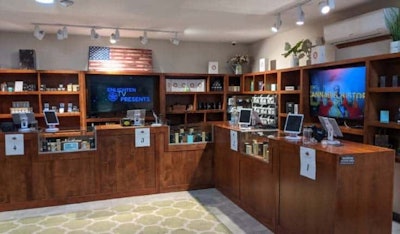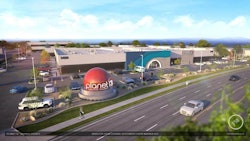
As of early June, the Arkansas medical cannabis market has generated more than $330 million in sales. With less than two years of operational business on the books, that’s a big number. That’s also more than 50,000 lbs. of cannabis.
The Arkansas market boasts 33 dispensaries, all serving more than 75,000 registered patients.
At the top of the list: The ReLeaf Center and its 5,000 lbs. of cannabis (and counting) sold since August 2019. It’s the first retailer in the state to achieve that milestone.
The ReLeaf Center earned of the first retail licenses in the state in 2019 and set up shop in Bentonville, a small city in the northwest corner of Arkansas. That’s where the bulk of sales would eventually come from, as it turned out, and the team behind the ReLeaf Center quickly set about developing a retail experience that catered to patients’ nuanced learning curve. In a new medical cannabis market, in mid-2019, what would a dispensary need to do to prove itself?
“The approach from the very beginning was really to create an experience that was unique to this space,” chief operating officer Matt Shanksy says. “It’s been an amazing journey, to say the least, just learning as much as possible along the way.”
The experience Shansky and Co. molded was something different than the high-security, metal bar-laden connotations of earlier adult-use dispensaries. The team wanted the place to feel comfortable, something closer to a tradition retail environment: not sterile, not off-putting.
Whenever possible, The ReLeaf Center team stresses the importance of cannabis education among its staff (the “why” behind the “what,” Shansky says, describing how the company’s budtenders stay on top of industry news and research). This redounds to the patient experience. When questions arise, The ReLeaf Center crew can capably answer them and encourage more focused shopping.
Two digital components that help The ReLeaf Center engage with patients include the company’s partnership with a licensed pharmacist and the electronic medical records maintained by the dispensary.
With the licensed pharmacist, patients have access to personalized consultations that may address the conditions experienced by the patient (and/or the interactions between cannabis and other medication they may be taking). And, over time, patients can track their medical cannabis experience with The ReLeaf Center’s electronic medical records—a database that gives each patient a chance to convey how a particular cultivar addressed a particular suite of conditions. If a patient presents with pain and anxiety, and Pineapple Express happens to alleviate those symptoms over 30 days of use, that progress can be tracked. It helps to have that data when the patient returns to the store.
That translates to the steady thrum of sales, of course. The ReLeaf Center routinely tops the list of Arkansas’s monthly medical cannabis updates. Shansky says that patients, by and large, continue to seek high-THC flower. It’s a fundamental trait of early-stage cannabis markets, though he does point out that vapes and edibles are climbing up the retail charts at the store.
“A lot of our team members are patients, as well, so using those personal experiences to leverage the conversations [with patients] has definitely helped,” Shanksy says. This builds on the educational tenets of the cannabis retail business. The ReLeaf Center has really foregrounded terpene profiles in its patient engagement, hoping to explain how THC interacts with the galaxy of chemical compounds found in the plant.
The ReLeaf Center also harbors ambitions of vertical integration and multi-state expansion. Later this year, the company will begin selling its own cannabis—grown in a 10,000-sq.-ft. on-site greenhouse. The cultivation operation launched in March. By fall or early winter, the team hopes to place ReLeaf Center-ground cannabis on store shelves. “We’re anticipating pretty high-quality product when we can get to that stage,” Shansky says.


























